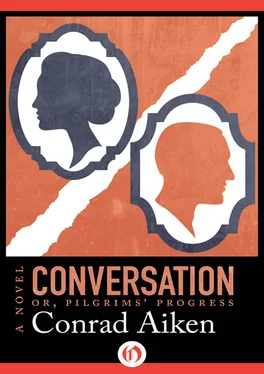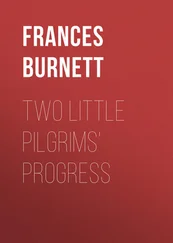“Oh, no, one never must be polite—”
“To one’s wife, no! You can leave her alone as much as you like.”
“Of course. That goes without saying.”
“And are you going to help me with the dishes?”
“I don’t think I will, if you don’t mind. I’m afraid I don’t feel very much like it, in the circumstances.”
“Oh! So you’re going to be ungenerous, too, into the bargain!”
“Ungenerous! Do you know I haven’t had five minutes today for my own work? Not that you care about it. And tomorrow and next day in town — don’t make me laugh.”
He smiled bitterly, opening the garden door, holding the screen door open with his foot. She turned towards him, her wet hands held up before her, her eyes wide, handsome, fiercely satirical.
“And may I ask,” she said, “where you are going, then? I suppose you’re going to work in the garden?”
“I’m just going out . It doesn’t seem to me to matter much! And if I want to work in the garden, or anywhere else that suits me, I certainly will!”
She stood still, her hands still held oddly up before her, as he turned away and went out, letting the screen door clack sharply shut behind him, he was aware as if through his back that she had not moved, still stood glaring contemptuously after him, her whole attitude one of helpless rage — and it gave him a kind of base satisfaction, as of a blow struck and not replied to, to turn towards the pump house and simply leave her there, entranced by her own fury. Let her stare, let her glare, let her rage. He had met her halfway long enough, it was her turn to worry now, the shoe would be on the other foot! If she thought he was as easy as all that, at the mercy of her beauty, or his love for her, to be whistled to and fro like a servant, a shadow, she would have another think coming. He opened the pump house door, looked down at the neat little engine, unseeing. But, of course, Binney had run it, no water was needed. Still, he could pretend to be examining the shut-off valve, for she would now be watching him from the window, watching for any sign of weakness — and after a moment he could saunter down to the foot of the garden, look at the lilacs, the site of the new cesspool, the river, the weather.
Buzzer’s little garland of pebbles still lay on the wet grass by the woodshed door, and on the floor of the wood-shed, just inside the open door, the box of toenail shells, the box of pink boat shells; and beyond these, by the empty, or all but empty, coalbin, the rainbow-hued sawhorse, on which Karl Roth had squeezed out his remnants of tubes. Long ago, far away, a year ago — and if Karl hadn’t come then, and hadn’t, half as a joke, asked Jim to run down for the night, none of this would have happened. Jim would never have fallen in love with this village, these marshes, would never have come here again on his so peculiar mission, everything would still be at peace. Or would it? There was a perverse fate in these things, perhaps it all would have happened anyway, and the whole business of Jim was only an accessory — had it all really started with Nora? I think I know how it is with you, I think you will know how it is with me .…
He stood still; for a moment it was as if he had stopped breathing. He had a sudden sharp vision of Nora, so sharp as to make him feel empty-armed, empty-handed — blue-eyed shameless Nora, lying on the couch in the half-darkened room, and laughing as she lifted one leg in the air to pull on a stocking — looking at him out of the corners of her eyes, and laughing, the garter clasp bright silver against the whiteness of her skin. But suppose Enid really left him — suppose it came to the worst — would he really want to marry Nora? No. There was no question of that, there had never been any question of that. It was a different thing, as they had both known from the outset, and wholly without illusions. A different thing. He had always loved Enid — as who could better testify than Nora herself, who had always accepted the fact? By god, what a wonderful irony that was, if only Enid could be told! The supreme immorality — or was it a supreme morality? No, no morals in the bloodstream, no morals in hand or claw or mouth — it was a shambles. Fidelity — there was no such thing, or only relative.…
He lifted down the shovel from its nail on the woodshed wall, scooped a little earth from the lilac border, sprinkled it tenderly in the crescent-shaped hoofmarks on the lawn, where Terence’s horse had stood pawing, filled them in and patted them down. There — the lawn would be all right even if nothing else was. The house might collapse and everything else with it, his world be blown to smithereens, but the hoofmarks of Terence’s horse on the lawn would be obliterated. What the hell did the grass care? The uncut hair of graves.
He was hanging the shovel up again, when he heard her steps behind him, the heavy soft swish of the corduroy skirt. She stood on the grass before the open door, facing him, dark against the darkening afternoon, her arms jauntily akimbo. He made to go past her, merely allowing his eyes to slide unperceptively over hers, but she moved as he moved, turning, pivoting, and said:
“And another thing. I think it would be only decent—”
He went past her without any answer, walked slowly to the top of the terrace wall, stooped there to examine the subsidence of wet fresh sand where the new cesspool was to be. He felt of it with his hand, as if idly, appraisingly, and saw, out of the corner of his eye, that, after a moment’s dismay, and an awkward balance of hesitation, she had decided to follow him, was coming very slowly towards him, her hands still on her hips. The steps gingerly, self-conscious, on the wet grass, like a slow kind of dancing. Graceful, but infuriating. And standing above him, looking down at him, she repeated:
“I said there was another thing.”
“Well, I heard you!”
“I think it would be only decent, when you inform Jim Connor, if you will be loyal enough not to try to put the blame on me. I think it ought to be put to him as your decision.”
“Oh, you do.”
“Yes, I do.”
He stood up, smiling grimly.
“I’ll do absolutely nothing of the sort! And aren’t you taking quite a lot for granted? I haven’t said yet, have I, that I would inform Jim Connor of anything . Put that in your pipe and smoke it.”
She was silent, the flecked green eyes faintly narrowed, the lips barely parted. For the first time she appeared to be a little taken aback and a little shaken; she was trying to fathom him. She had folded her arms across her breast, stood slightly swaying.
“And now,” he added, “if you don’t too much mind I’ll try to get in the daily ten minutes’ work that is allowed to me. Or five. If you can spare me that much!”
He went past her again, smiling. Her lips were now pressed tight, the mouth beautiful and hard, and for the merest fraction of a second, as he passed, their eyes, engaging, locked in the purest and cruelest hate — it was an exchange of ice. There! Let her laugh that off. Let her work that out, in her bedtime thinking! And write to mamma about it. And go around crying on the public bosom. And put it in the papers. And tell Mabel and George and Paul. Let her stand there, like a statue of protest, under the dark sky, waiting for rain — it was not for nothing that she had a sense of the dramatic, and knew how damned handsome she was — but for once, by god, what a good thing it would be if she got her belly full of it! Let it pour.
In the studio, he turned the easel to the light, laid out the palette and the neat row of brushes — but what was the use. Impossible to concentrate now, to steady one’s nerves in this turmoil, to peel one’s eyes of anger and hate — it was like a red film over everything.
Читать дальше












